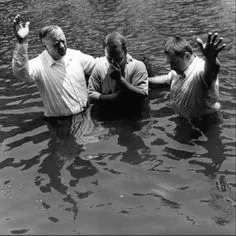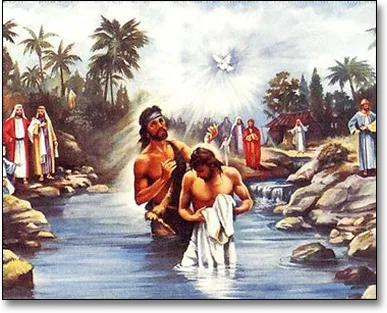
With a wealth of information that can be found on the internet and sites like YouTube, also Christian teachers or churches post their view on all kind of topics. For me it is disturbing to see how often the basic teaching of the bible is compromised. In the last month I have seen and heard several preachers talk about baptism and refer to it as something that is by no means necessary to get saved but instead somewhat of a outward gesture. Therefor I would like to share with you what has been Christian biblical teaching for the last 2000 years.
The Meaning of the Word
In addressing the important significance of BAPTISM in Christian experience, it is necessary to fully understand the meaning and common usage of the word in the New Testament Greek. On this point there does not seem to be any special debate. It is only concerning the importance of baptism as doctrine that controversy arises.
BAPTIZO in the New Testament pertains to both baptism in water and in the Holy Spirit, although other expressions such as "baptism of suffering" are also used. Infant baptism cannot be found in the scriptures.
BAPTIZO comes from BAPTO: meaning to dip into water, or to dye; and BAPTIZO: means to immerse, sink or to overwhelm, so as to submerge, as in a shipwreck; to plunge under, as in bathing oneself; or, of dyeing a garment to a new colour.
In the Old Testament Septuagint (the Greek Old Testament), Naaman is described as having dipped, i.e. BAPTIZO himself in the Jordan seven times (See 2 KINGS 5:14). In the New Testament, vessels were cleansed by dipping or submerging them - BAPTIZO, to make them clean in water (MARK 7:4; LUKE 11:39).
The New Testament Greek allows no interpretation of sprinkling as a substitute for baptism. An entirely different word describes sprinkling - RATISMOS. This word is used for sprinkling of blood, denoting the cleansing achieved through the Blood of Jesus (HEBREWS 12:24; 1 PETER 1:2).
In HEBREWS 6:2, reference is made to the doctrines of BAPTISMOI or BAPTISMA - divers washing (see also HEBREWS 9:10). Reference here is made either to the ceremonial washing of the Old Testament (the carnal ablutions conducted under Mosaic ritual), or to water baptism (MATTHEW 28:19) and Spirit baptism (ACTS 1:5), and even baptism of suffering (MATTHEW 20:23).
Old Testament Baptisms
In the Old Testament context, baptism is used in connection with various purifications in the statutes and ordinances of Tabernacle and Temple worship. Purification by water was required of:
- Priests before entering the Tabernacle (EXODUS 30:17-21). Aaron and his sons were wholly bathed in water in their consecration to the priesthood (EXODUS 29:4; LEVITICUS 8:6).
- The High Priest on the day of Atonement (LEVITICUS 16:23-24).
- Individuals considered ceremonially unclean (LEVITICUS 14,15).
- Of Lepers before returning to the camp of the people (LEVITICUS 17:15; LEVITICUS 22:4-6; LEVITICUS 14:8-9).
Waters-of-separation were required of all people for them to remain in the "camp of the Lord" (see NUMBERS 19).
The use of water in the Old Testament rituals, was always associated with the approach of people to the God of Israel, to retain His favour and blessing.
In Israel, these BAPTISMOI in type or shadow, were to act in part, as a "schoolmaster" to bring them to Christ.
Following the agreement of Israel as a nation to obey and serve God, Moses demanded that the people sanctify themselves and wash. This was an ordinance of national sanctification over a three day period. On the third day God said He would come down in the sight of the Israelite nation, upon Mount Sinai.
"...And it came to pass on the third day in the morning, that there were thunders and lightnings, and a thick cloud upon the mount ... the LORD descended upon it in FIRE ... Moses spake, and God answered him by a voice" (EXODUS 19:10-25).
In the Old Testament, no man could serve God unless he was clean (NUMBERS 8:7). Likewise, in the New Testament, no man is free to serve Jesus as Lord unless he is free from the grime and grip of sin.
Before entering into service, Aaron the appointed High Priest and his priestly sons were washed in water (LEVITICUS 8:6) and anointed in oil (symbolising the anointing of the Holy Spirit), from tip to toe, over their heads and beards, to the very borders of their garments, right down to their feet (PSALM 133; EXODUS 29:7).
Aaron, as the High Priest of the People of Israel, was also commanded to wash his flesh in the Holy Place.
The whole pattern of uncleanness and sin and the need for washing (in water) is exemplified in the Old Testament - "If he "(any soul) "...bathe not his flesh; then he shall bear his iniquity" (LEVITICUS 17:16).
In like manner, Jesus commands, "He that believeth and is baptized shall be saved; but he that believeth not "(does not obey)" shall be damned" (MARK 16:16). The burden of his iniquity, therefore, remains upon him - death rules.
In 1 CORINTHIANS 10:1-3, Paul takes up the historical record of Israel as a nation, having passed through the Red Sea and the Cloud, representing in type, the baptism of the Nation in water and in Spirit.
When Jesus walked amongst His fellow Judahites (Jews), ceremonial washing no longer possessed any real significance other than an outward show of liturgical purification, so overlaid with rules and forms that they had lost their meaning (MARK 7:4-5).
One pattern of ceremony which did retain more significance concerned the baptism of proselytes to Judaism. In this, the heathen's conversion was illustrated by his total immersion. Initially, he was to sit up to his neck in water and then plunge himself under the water to identify himself as being cleansed of all the defilements of heathenism. Thus, he was able to enter clean into a new relationship with God's covenanted people.
Perhaps we can see from these practices that baptism was not something invented by John, but something which he restored and reconstituted in contrast to the perverted rigmarole within Pharisaic Judaism.
Ceremonial washings (Baptismoi) of the Old Testament effected nothing but external purification and "could not make him that did the service perfect, as pertaining to the conscience" (HEBREWS 9:9).
John's Baptism

When John came up out of the deserts proclaiming the baptism of repentance, he was a revolutionary who was prepared to overthrow 400 years of priestly formalism; he was a radical, "The voice of one crying in the wilderness..." (MATTHEW 3:3). The Word of God had come to John in the wilderness for him to preach repentance and herald the soon-coming Messiah: "Repent ye: for the kingdom of heaven is at hand."
The interesting thing is that even the Pharisees and Sadducees recognised John's baptism. They came out to 'see' his baptism and were embarrassingly rebuked by him: "O generation of vipers, who hath warned you to flee from the wrath to come? Bring forth therefore fruits meet for repentance" (MATTHEW 3:7-8).
"What did you come out to see?"
It is very likely that these "keepers of the Law" knew that their "divers washings" pointed to the washing the Messiah was to bring. Hence, they questioned John: "Why baptizest thou then, if thou be not that Christ, nor Elias, neither that prophet?" (JOHN 1:25).
John simply answered that he was the "voice" stating that the greater one would come and baptise with the Holy Spirit and fire (MATTHEW 3:11; JOHN 1:29-34).
Later on, Jesus in turn, questioned the Pharisees: "The baptism of John, was it from heaven, or of men?" (MATTHEW 21:25; MARK 11:30; LUKE 20:4).
They dare not answer! If they said "of men", the people would reject them and if they said, "from heaven" then why did they not submit themselves to it? (LUKE 7:30).
Only the people acknowledged John as a prophet.
When Jesus came to be baptised by John, He identified Himself with the value of repentance (though He had no need to repent). He also identified as a man. "Why do you come to be baptised by me?" said John. "Suffer it to be so now: for thus it becometh US to fulfil all righteousness" (MATTHEW 3:15).
Indeed Jesus' baptism by John in water fulfilled the requirements of the Levitical Law in His consecration as Priest, when he "began to be about thirty years of age..." (NUMBERS 4:3; NB. LUKE 3:23).
His further anointing in the Holy Spirit perfected, in type, what had been the oil of anointing experienced by the priests of Moses (EXODUS 29:4-7; LEVITICUS 8:6-12-36; PSALM 133).
Jesus' Baptism

"Then cometh JESUS from Galilee to Jordan unto John, to be BAPTIZED of him. But John forbade him, saying, I have need to be baptized of thee, and comest thou to me? And Jesus answering said unto him, Suffer it to be so now: for thus it becometh US to fulfil all righteousness" (MATTHEW 3:13-15).
And so Jesus was baptised of John (going down into the water of the Jordan river and coming up out of the water). Why? What sin had Jesus to repent of or confess? For this was indeed demanded of all who came to John: repentance and confession of sin. But why Jesus? "Who did no sin, neither was guile found in his mouth" (1 PETER 2:22).
By being baptised by John, Jesus was deliberately setting an example and a pattern to which all believers were expected to follow.
"...because Christ also suffered for us, leaving us an example, that ye should follow his steps" (1 PETER 2:21). "Thus, it becometh US", said Jesus, "to fulfil ALL righteousness".
Thus, it becometh US - in this or like manner it is fitting that we should follow Jesus' example to fulfill, or make complete, all righteousness; a righteousness which, as believers in Christ Jesus, can only be imparted to us by or through our total confidence and faith in Him.
"...being justified "(i.e. made righteous) "by faith, we have peace with God through our Lord Jesus Christ" (ROMANS 5:1).
The paramount reason why we, as believers, offer ourselves in baptism is firstly to identify with Jesus and secondly, to complete or fulfill all righteousness and to show by an outward act of obedience, the inward righteousness afforded by the grace of God.
Jesus always possessed within Himself the righteousness (and peace) with His Father. However, by offering Himself for baptism by John, Jesus fulfilled it; He completed this inward righteousness with the outward act of obedience to the will of His heavenly Father.
Thus, when Jesus was baptised, the heavens opened unto Him, and He saw the Spirit of God descending like a dove and lighting upon Him - and a voice from heaven said, "This is my beloved SON, in whom I am well pleased"(MATTHEW 3:16-17).
"Thus, it becometh US..."
Christian Baptism
Christian baptism in water exceeds and now supersedes John's baptism. John's baptism was but a temporary expedient to cover repentance and confession of sin until Jesus provided complete righteousness. Thus, for the "Christian" believer, baptism not only covers repentance and confession of sin, but promotes identification by faith, in the atoning death and resurrection of Jesus. It is an outward expression of obedience towards God, to affirm the inward desires of a repentant heart.
Any candidate for baptism must first have been taught or instructed concerning the gospel of salvation; he must have made a decision to repent of sin, and to place wholehearted confidence in the atoning death, resurrection, and ascension of Jesus as Lord; and furthermore, by submitting to baptism, must be able to answer God with a good conscience. These conditions automatically rule out infants.
An infant:
- cannot be taught or instructed;
- is unable to repent of sin;
- has no way of believing in Jesus; and
- cannot answer with a good conscience.
Finally
Countless academic articles have been presented concerning water baptism. Actually, the move to baptism is rather the result of repentance than technical persuasion. The principle of baptism "after" repentance and by "immersion" is inevitable.
All historical records identify baptism with "immersion". Changes in tradition and scholastic "research" have robbed water baptism of its original meaning and simplicity. May the reader be aided to simplicity rather than complicity.
Why baptism:
To wash away sins - "And now why tarriest thou? Arise, and be baptized, and wash away thy sins, calling on the name of the Lord." (Acts 22:16)
To get saved - "The like figure whereunto even baptism doth also now save us (not the putting away of the filth of the flesh, but the answer of a good conscience toward God,) by the resurrection of Jesus Christ:" (1 Peter 3:21)
Both verses use the Greek word BAPTISMA (the state of having been submerged).
